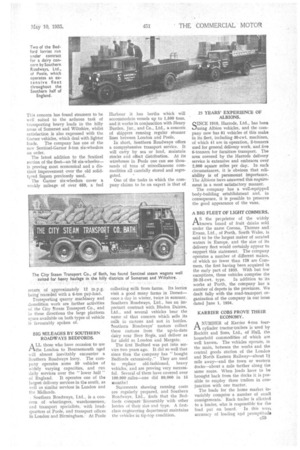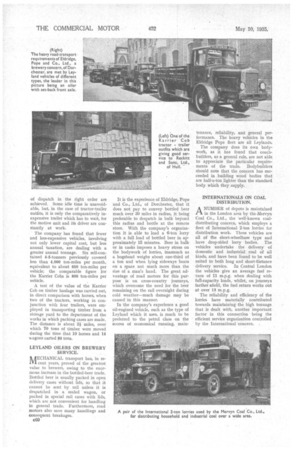25 YEARS' EXPERIENCE OF ALBIONS.
Page 117

Page 118

If you've noticed an error in this article please click here to report it so we can fix it.
QINCE 1910, Harrods, Ltd., has been Ousing Albion vehicles, and the company now has 81 vehicles of this make in its fleet, including 30-cwt. machines, of which 41 are in operation, 2-tonners used for general delivery work, and five 6-tonnera for furniture transport. The area covered by the Harrods delivery service is extensive and embraces over 2,000 square miles per day. In such circumstances, it is obvious that reliability is of paramount importance. The Albions have answered this requirement in a most satisfactory manner.
The company has a well-equipped body-building establishment and, in consequence, it is possible to preserve the good appearance of the vans.
A BIG FLEET OF LIGHT COMMERS.
A'the prcprietor of the widely known brand of fruit drinks sold under the name Corona, Thomas and Evans, Ltd., of Porth, South Wales, is said to be the largest maker of aerated waters in Europe, and the size of its delivery fleet would certainly appear to support this statement. The company operates a number of different makes, of which no fewer than 128 are Cornmers, the first having been acquired in the early part of 1933. With but few exceptions, these vehicles comprise the
20-25-cwt. type. In addition to its works at Porth, the company has a number of depots in the provinces. We dealt fully with the road-transport organization of the company in our issue dated June 1, 1934.
KARRIER COBS PROVE THEIR ECONOMY.
ANUMBER of Karder 4-ton fourcylinder tractor-trailers is used by Reckitt and Sons, Ltd., of Hell, the household commodities of which are well known. The vehicles operate, in the main, between the works and the central goods station of the London and North Eastern Railway—about mile away—and the town or western docks—about a mile farther along the same route. When loads have to be brought back from the docks it is possible to employ three trailers in conjunction with one tractor.
The loads for the home market invariably comprise a number of small consignments. Each trailer is allotted to a loader, who is responsible for the load put on board. In this ways accuracy of loading and promptitude
of dispatch in the right order are achieved. Some idle time is unavoidable, but, in the case of tractor-trailer outfits, it is only the comparatively inexpensive trailer which has to wait, for the motive unit and its driver are constantly at work.
The company has found that fewer and less-expensive vehicles, involving not only lower capital cost, but less annual -taxation, are dealing with a greater annual tonnage. Six self-contained 4-5-tonners previously covered less than 4,000 ton-miles per month, equivalent to about 650 ton-miles per vehicle; the comparable figure for the Karrier Cobs is 500 ton-miles per vehicle.
A test of the value of the Karrier Cob on timber haulage was carried out, in direct comparison with horses, when two of the tractors, working in conjunction with four trailers, were employed in transporting timber from a storage yard to the department of the works in which packing cases are made. The distance is about 2imiles, over which 70 tons of timber were moved during the time that 10 horses and 14 -wagons carted 80 tons.
LEYLAND OILERS ON BREWERY SERVICE.
NRECHANICAL transport has, in reiVi cent years, proved of the greatest value to brewers, owing to the enormous increase in the bottled-beer trade. Bottled beer is usually packed in open delivery cases without lids, so that it cannot be sent by rail unless it is despatched in a sealed wagon, or packed in special rail cases with lids, which are not convenient for handling in general trade. Furthermore, road motors also• save many handlings and consequent breakages. It is the experience of Eldridge, Pope and Co., Ltd., of Dorchester, that it does not pay to convey bottled beer much Over 30 miles in radius, it being preferable to despatch in bulk beyond this radius and bottle at the remote store. With the company's organization it is able to load a 6-ton lorry with a full load of bottled beer in approximately 15 minutes. Beer in bulk or in casks imposes a heavy stress on the bodywork of lorries, inasmuch as a hogshead weighs about one-third of a ton and when lying sideways bears on a space not much more than the size of a man's hand. The great advantage of road motors for this purpose is on cross-country journeys, which overcome the need for the beer remaining on the rail overnight during cold weather—much damage may be caused in this manner.
In the company's experience a good oil-engined vehicle, such as the type of Leyland which it uses, is much to be preferred to the petrol class on the scores of economical running, main
tenance, reliability, and general performance. The heavy vehicles in the Eldridge Pope fleet are all Leylands.
The company does its own bodywork, as it has found that coachbuilders, as a general rule, are not able to appreciate the particular requirements of the trade. Bodybuilders should note that the concern has succeeded in building wood bodies that are half-a-ton lighter than the standard body which they supply.
INTERNATIONALS ON COAL DISTRIBUTION.
ANUMBER of depots is maintained in the London area by the Mervyn Coal Co., Ltd., the well-known coaldistributing concern, which employs a fleet of International 2-ton lorries for distribution work. These vehicles are all of the short-wheelbase type and have drop-sided lorry bodies. The vehicles undertake the delivery of domestic and industrial coal of all kinds, and have been found to be well suited to both long and short-tlistance delivery service. In Central London the vehicles give an average fuel return of 11 m.p.g. when dealing with full-capacity loads, whilst, on journeys farther afield, the fuel return works out at over 13 m.p.g.
The reliability and efficiency of the lorries have materially contributed towards maintaining the high tonnage that is dealt with, another important factor in this connection being the efficient service organization controlled by the International concern. ,




































































































































































